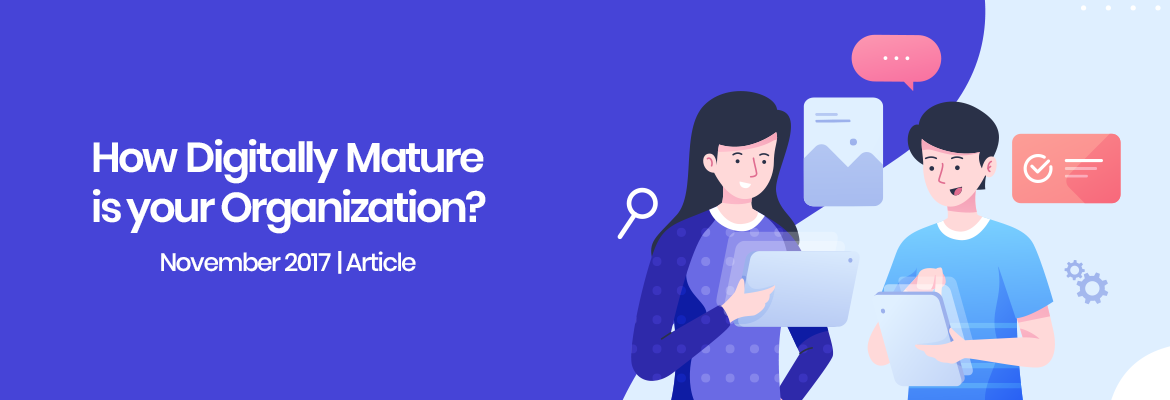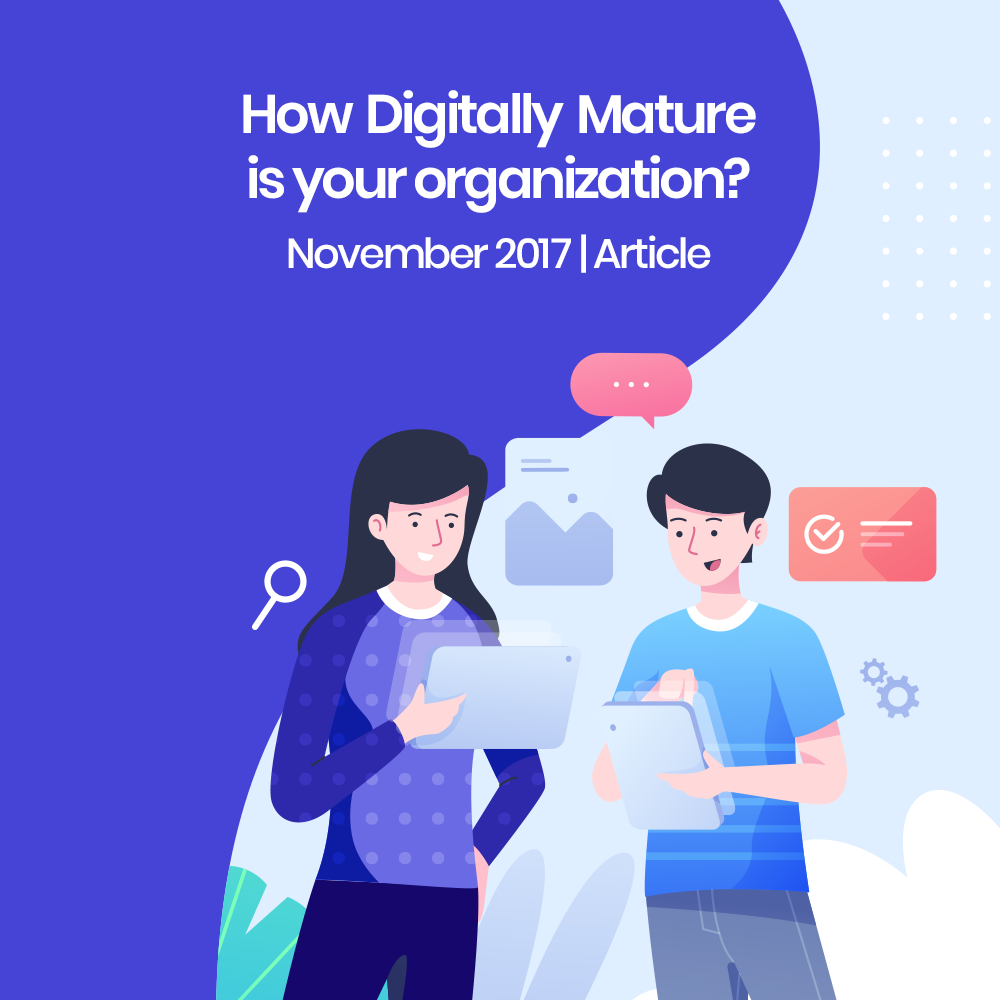

Leading a business in the complex digital world can be daunting. A looming fear of disruption, a need for constant review of your business, never-ending investment conversations on the latest technologically advanced tools and techniques, rethinking every working business strategy again and again just to (somewhat) stay ahead of the game (or curve, or platform…). It can surely feel like everything one learns to succeed not only has an expiry date but the process includes being proved wrong, unlearn the skill, relearn it again and yet fail. Miss those days of snooze and cruise? You are not alone.
A 2017 MIT study of 1000 CEO’s (from 131 countries and 27 industries) showed that 90% of the developing world CEO’s believe that their businesses were on the verge of being disrupted or reinvented by digital business models. Yet, 70% of them did not have the right vision, acumen, leadership, or operating structure to adapt and compete in the business environment needed for such change. The developed world too has many such examples which makes one wonder about a new age ‘digital leadership’ and what it really represents. Does it exist? What’s the ideal make-up of it? What are the cultural and geographical nuances to the successful ones? Can such types of leadership be created or curated? Can the right attitude about focusing on empowerment, experimentation, collaboration, data, and speed be instilled in them? The answer, as always is, ‘it depends’… on way too many factors including the ‘will’ to adapt, update and reinvent (on a continuous basis).
So how do successful leaders stay ahead in this game (at least for now)?
Many invest heavily in technology (some without a clue as to what to buy/not buy). Some hire folks that drop in the right buzz phrases and claim to have the right experience in the right job titles (Chief digital officer, chief transformation officer, chief data officer, chief innovation office etc.), a few bring on young startup stalwarts as advisers / mentors / guides to guide them on this complex journey (brilliant move if done right), a few seek opinion and council from their leading customers (another brilliant move rarely done right) and a few just roll their sleeves, open their minds, learn, adapt and lead.
Regardless of the success they achieve, kudos to these brave souls to at least take shots at the unknown but while they deserve all the credit for the effort sadly, most of them do not have the right chops to succeed. Something that they can’t be blamed for completely as a lot of this is new, they are used to carrying their careers in a certain way (certain not this way), acquiring skills that may not be as relevant today as they were years ago and the constant second-guessing themselves (these models humble you in ways beyond imagination) is something they are just not willing to get used to. The study also suggests that about 70% of the surveyed organizations reported their leadership (c-suite/board) to not possess the essential digital thinking and skills to drive them to success in the digital world. 77% also considered missing skills a ‘key hurdle’ in their organization’s digital transformation journeys and a roadblock for future success.
So if all this is missing in most leaders, what is a path taken by the leaders of the organizations that get it and continuously win?
They overcome a traditional mindset with a new way of thinking
Succeeding in this game requires a constant rethink. The ones that survive stay in permanent beta where their product or the service continues to evolve and so does the leadership, it’s style, it’s thinking, its skills and everything that comes with it. If they do not employ this type of an open mind and a willingness to change, the digital disruptors from inside and outside (their industry) would eat their lunch in a heartbeat.
They assess the digital maturity of their employees and the organization
 Without a deep understanding of where the organization (and its employees) really stand in their digital thinking (if they have one), one can’t really expect to throw at them the next challenge that requires innovating using digital methods. Engaging in a Digital Maturity and Digital Acumen Assessment that measures the individual/divisional/organizational capabilities across multiple business domains and competence areas can be a real starting point where the results become the ultimate guide on how success should be shaped in the future. And while the industry norm is to assess digital maturity of the organization, its practices, systems etc, it is more important to assess the individuals on their aptitudes and abilities first, so that their collective (divisional and overall organizational) maturity can be adequately mapped and upgraded to deliver on the renewed digital vision of the organization.
Without a deep understanding of where the organization (and its employees) really stand in their digital thinking (if they have one), one can’t really expect to throw at them the next challenge that requires innovating using digital methods. Engaging in a Digital Maturity and Digital Acumen Assessment that measures the individual/divisional/organizational capabilities across multiple business domains and competence areas can be a real starting point where the results become the ultimate guide on how success should be shaped in the future. And while the industry norm is to assess digital maturity of the organization, its practices, systems etc, it is more important to assess the individuals on their aptitudes and abilities first, so that their collective (divisional and overall organizational) maturity can be adequately mapped and upgraded to deliver on the renewed digital vision of the organization.
They create transformation roadmaps for ultimate success
Through measured, targeted and well-planned workshops, alignment deep dives, focus groups, bootcamps, and innovative initiatives, these leaders create success Digital Transformation Roadmaps that tie to the vision of the organization. The results of the assessments become the main ingredients of these customized roadmaps that act as a baseline for true learning and enablement. If done right, a true culture of innovation and growth emerges from within that takes clues from the evolving landscape of the new technology world order and sets a path of success.
They make digital learning part of the culture
Digital acumen cannot be acquired with a one-week training course. It’s a journey. And the essential ingredients in this journey are periodical checkpoints and learnings along the way that continue to manage progress. After-all, evolution and innovation does not stop. Why should the education around it? While attending a few yearly conferences and meetings is key and one should continue to do so on various topics and trends that are shaping the world, they just scratch the surface of what is needed to take this on and win. Organizations starting on these journeys should understand that creating a culture of continuous learning is not only important, but essential for the survival of the business. And this needs to begin from the top. Leaders of these organizations (board/c-suite) need to invest in employees’ education and craft roles, industry and organization specific learning journeys that take them on a mechanized path of learning to progress their careers. These learnings should/can be a combination of in-person training, online and video methods, executive coaching and other methods and should be tied to an employee’s performance and career growth. Online learning communities outside of the organization (YouTube, LinkedIn, Coursera, Udemy, Khan Academy, others) can also play a vital role in continuous learning and growth.
Achieve digital maturity; The TransformX way
As is the TransformX way, for such initiatives, we recommend that our clients bring an open state of mind to defining digital. ‘Digital’ is far more than technology, a process or a mission statement; it is a way of doing things, a state of mind, a belief system. Elements of our two signature offerings Organizational Transformation and Employee Enablement are combined to run Digital Maturity Assessments and Digital Acumen Assessments that provide a baseline of where things stand on the organization and the employee side and identifies key areas that need to be addressed from a strategy, process, technology or a skill-building level across the board. These insights are then used to create bespoke Digital Transformation Roadmaps and Digital Learning Journeys to set our clients on a path of growth, profitability and the exploration of new digital/data enabled business models and revenue streams. We look forward to partnering with you on your next culturally infused digital transformation initiative.
Leading a business in the complex digital world can be daunting. A looming fear of disruption, a need for constant review of your business, never-ending investment conversations on the latest technologically advanced tools and techniques, rethinking every working business strategy again and again just to (somewhat) stay ahead of the game (or curve, or platform…). It can surely feel like everything one learns to succeed not only has an expiry date but the process includes being proved wrong, unlearn the skill, relearn it again and yet fail. Miss those days of snooze and cruise? You are not alone.
A 2017 MIT study of 1000 CEO’s (from 131 countries and 27 industries) showed that 90% of the developing world CEO’s believe that their businesses were on the verge of being disrupted or reinvented by digital business models. Yet, 70% of them did not have the right vision, acumen, leadership, or operating structure to adapt and compete in the business environment needed for such change. The developed world too has many such examples which makes one wonder about a new age ‘digital leadership’ and what it really represents. Does it exist? What’s the ideal make-up of it? What are the cultural and geographical nuances to the successful ones? Can such types of leadership be created or curated? Can the right attitude about focusing on empowerment, experimentation, collaboration, data, and speed be instilled in them? The answer, as always is, ‘it depends’… on way too many factors including the ‘will’ to adapt, update and reinvent (on a continuous basis).
So how do successful leaders stay ahead in this game (at least for now)?
Many invest heavily in technology (some without a clue as to what to buy/not buy). Some hire folks that drop in the right buzz phrases and claim to have the right experience in the right job titles (Chief digital officer, chief transformation officer, chief data officer, chief innovation office etc.), a few bring on young startup stalwarts as advisers, mentors, guides to guide them on this complex journey (brilliant move if done right), a few seek opinion and council from their leading customers (another brilliant move rarely done right) and a few just roll their sleeves, open their minds, learn, adapt and lead.
Regardless of the success they achieve, kudos to these brave souls to at least take shots at the unknown but while they deserve all the credit for the effort sadly, most of them do not have the right chops to succeed. Something that they can’t be blamed for completely as a lot of this is new, they are used to carrying their careers in a certain way (certain not this way), acquiring skills that may not be as relevant today as they were years ago and the constant second-guessing themselves (these models humble you in ways beyond imagination) is something they are just not willing to get used to. The study also suggests that about 70% of the surveyed organizations reported their leadership (c-suite, board) to not possess the essential digital thinking and skills to drive them to success in the digital world. 77% also considered missing skills a ‘key hurdle’ in their organization’s digital transformation journeys and a roadblock for future success.
So if all this is missing in most leaders, what is a path taken by the leaders of the organizations that get it and continuously win?
They overcome a traditional mindset with a new way of thinking
Succeeding in this game requires a constant rethink. The ones that survive stay in permanent beta where their product or the service continues to evolve and so does the leadership, it’s style, it’s thinking, its skills and everything that comes with it. If they do not employ this type of an open mind and a willingness to change, the digital disruptors from inside and outside (their industry) would eat their lunch in a heartbeat.
They assess the digital maturity of their employees and the organization
Without a deep understanding of where the organization (and its employees) really stand in their digital thinking (if they have one), one can’t really expect to throw at them the next challenge that requires innovating using Digital methods. Engaging in a Digital Maturity and Digital Acumen Assessment that measures the Individual, Divisional, Organizational capabilities across multiple business domains and competence areas can be a real starting point where the results become the ultimate guide on how success should be shaped in the future. And while the industry norm is to assess digital maturity of the organization, its practices, systems etc, it is more important to assess the individuals on their aptitudes and abilities first, so that their collective (divisional and overall organizational) maturity can be adequately mapped and upgraded to deliver on the renewed digital vision of the organization.
They create transformation roadmaps for ultimate success
Through measured, targeted and well-planned workshops, alignment deep dives, focus groups, bootcamps, and innovative initiatives, these leaders create success Digital Transformation Roadmaps that tie to the vision of the organization. The results of the assessments become the main ingredients of these customized roadmaps that act as a baseline for true learning and enablement. If done right, a true culture of innovation and growth emerges from within that takes clues from the evolving landscape of the new technology world order and sets a path of success.
They make digital learning part of the culture
Digital acumen cannot be acquired with a one-week training course. It’s a journey. And the essential ingredients in this journey are periodical checkpoints and learnings along the way that continue to manage progress. After-all, evolution and innovation does not stop. Why should the education around it? While attending a few yearly conferences and meetings is key and one should continue to do so on various topics and trends that are shaping the world, they just scratch the surface of what is needed to take this on and win. Organizations starting on these journeys should understand that creating a culture of continuous learning is not only important, but essential for the survival of the business. And this needs to begin from the top. Leaders of these organizations (board, c-suite) need to invest in employees’ education and craft roles, industry and organization specific learning journeys that take them on a mechanized path of learning to progress their careers. These learnings should, can be a combination of in-person training, online and video methods, executive coaching and other methods and should be tied to an employee’s performance and career growth. Online learning communities outside of the organization (YouTube, LinkedIn, Coursera, Udemy, Khan Academy, others) can also play a vital role in continuous learning and growth.
Achieve digital maturity; The TransformX way
As is the TransformX way, for such initiatives, we recommend that our clients bring an open state of mind to defining digital. ‘Digital’ is far more than technology, a process or a mission statement; it is a way of doing things, a state of mind, a belief system. Elements of our two signature offerings Organizational Transformation and Employee Enablement are combined to run Digital Maturity Assessments and Digital Acumen Assessments that provide a baseline of where things stand on the organization and the employee side and identifies key areas that need to be addressed from a strategy, process, technology or a skill-building level across the board. These insights are then used to create bespoke Digital Transformation Roadmaps and Digital Learning Journeys to set our clients on a path of growth, profitability and the exploration of new digital, data enabled business models and revenue streams. We look forward to partnering with you on your next culturally infused digital transformation initiative.




